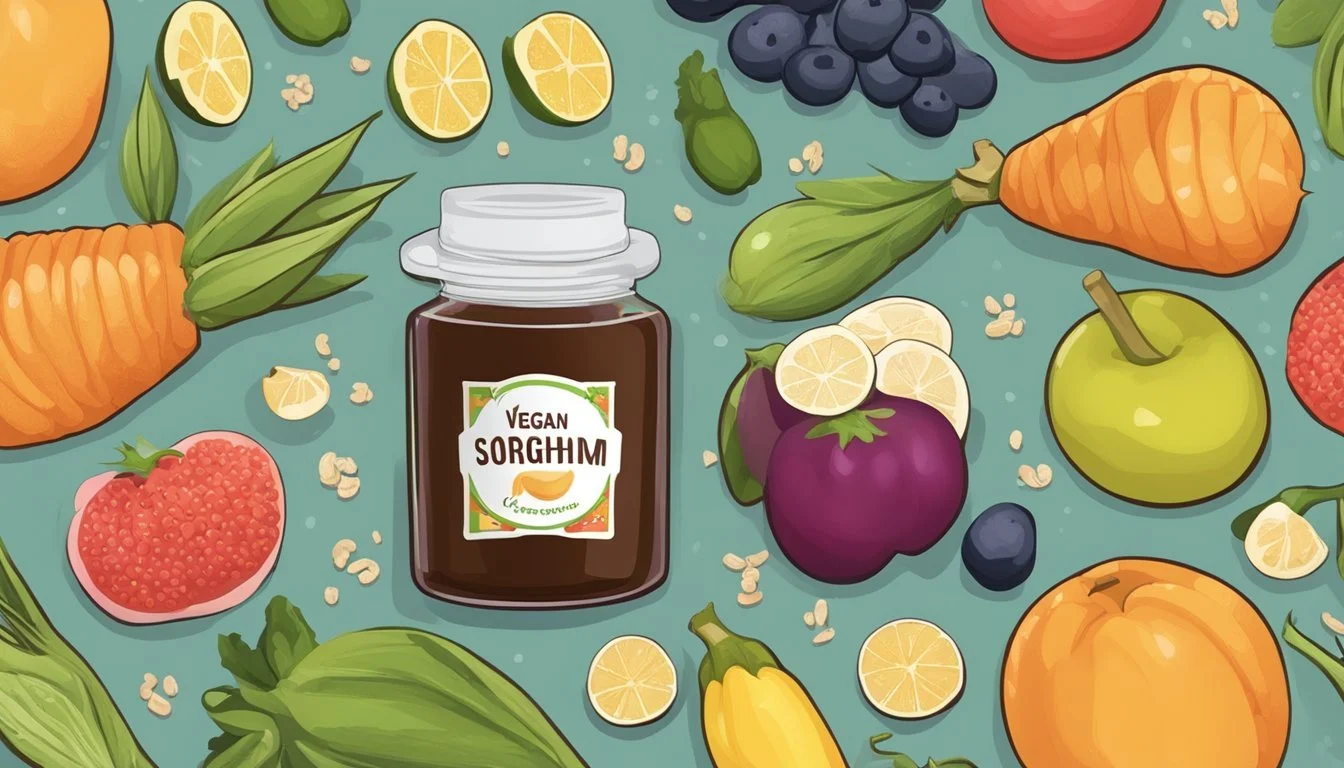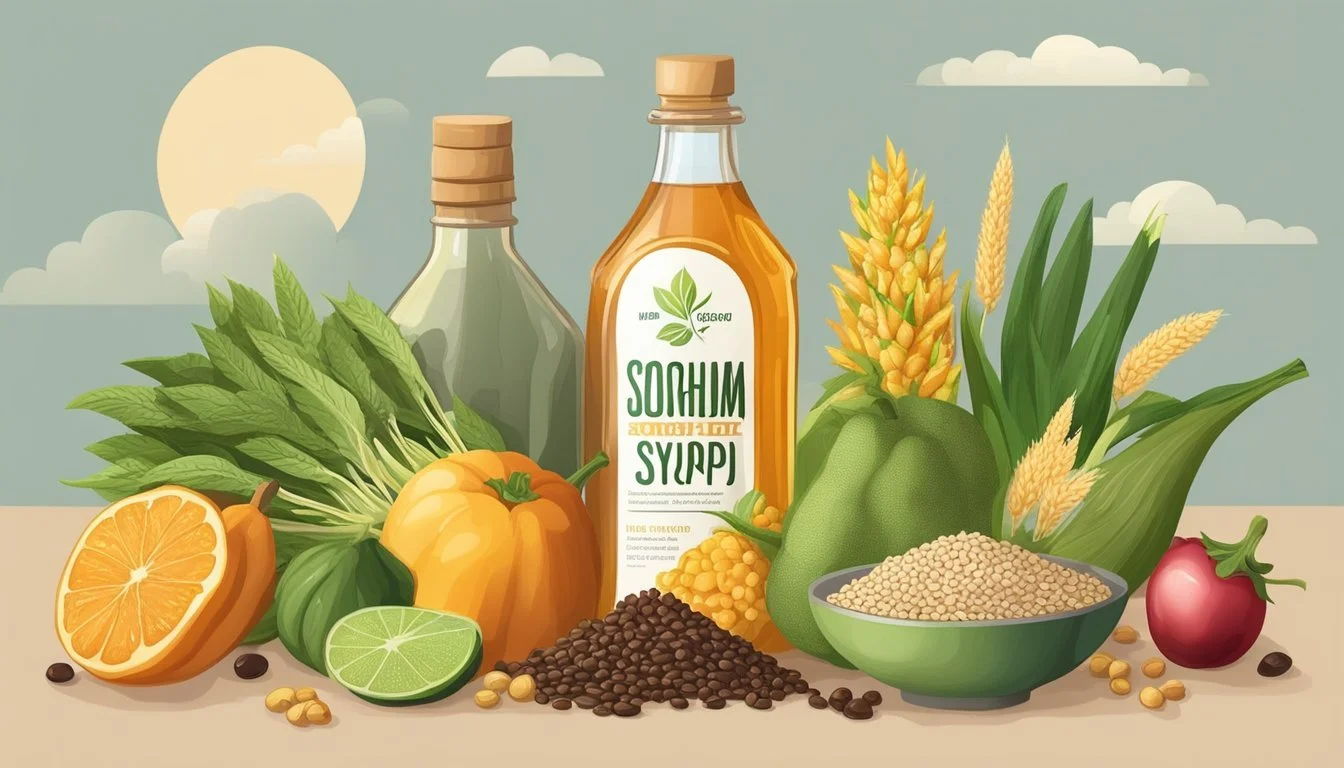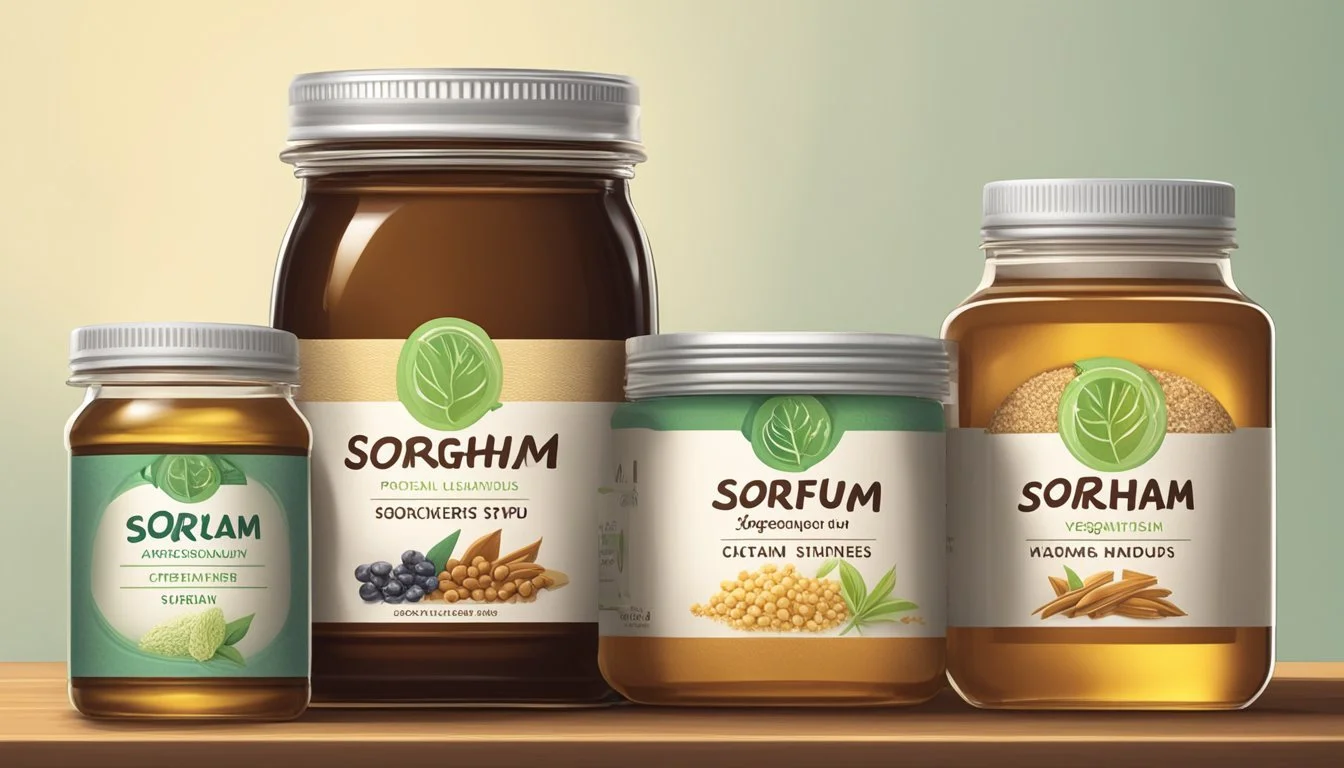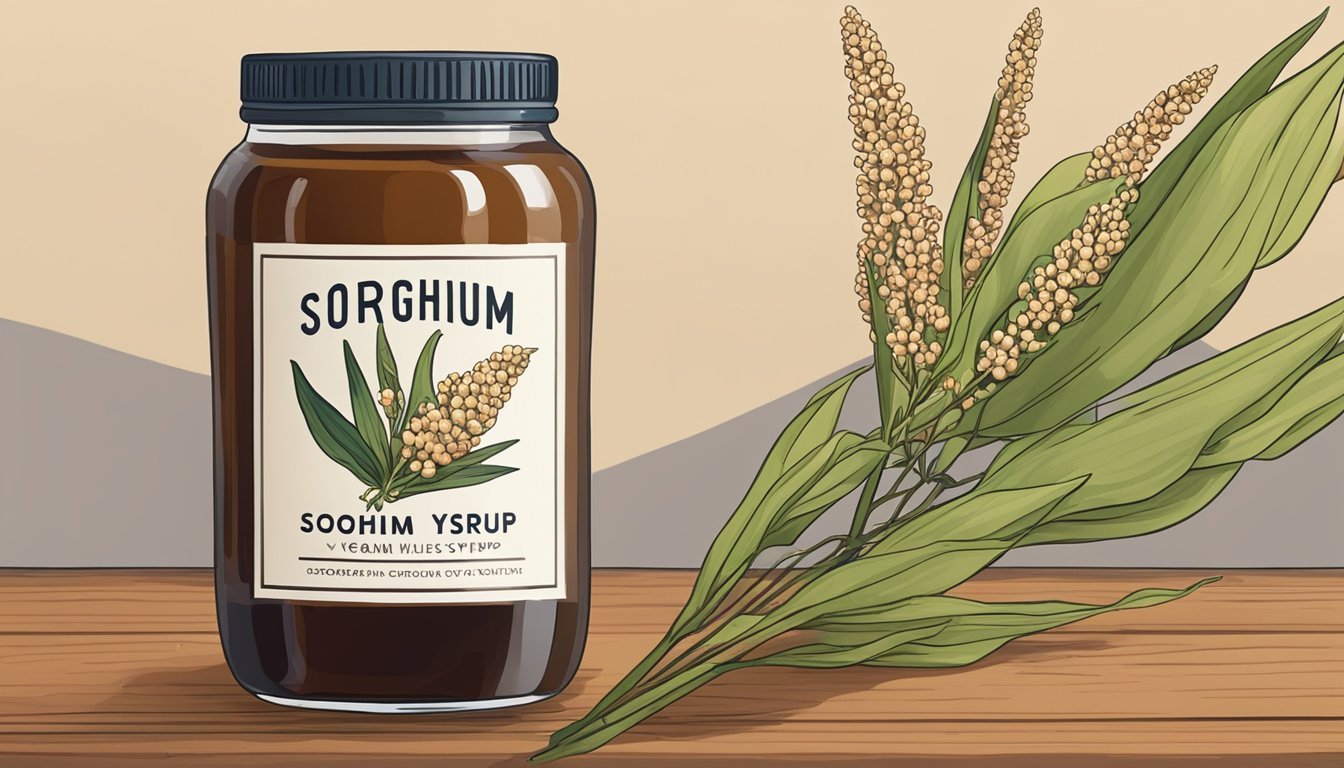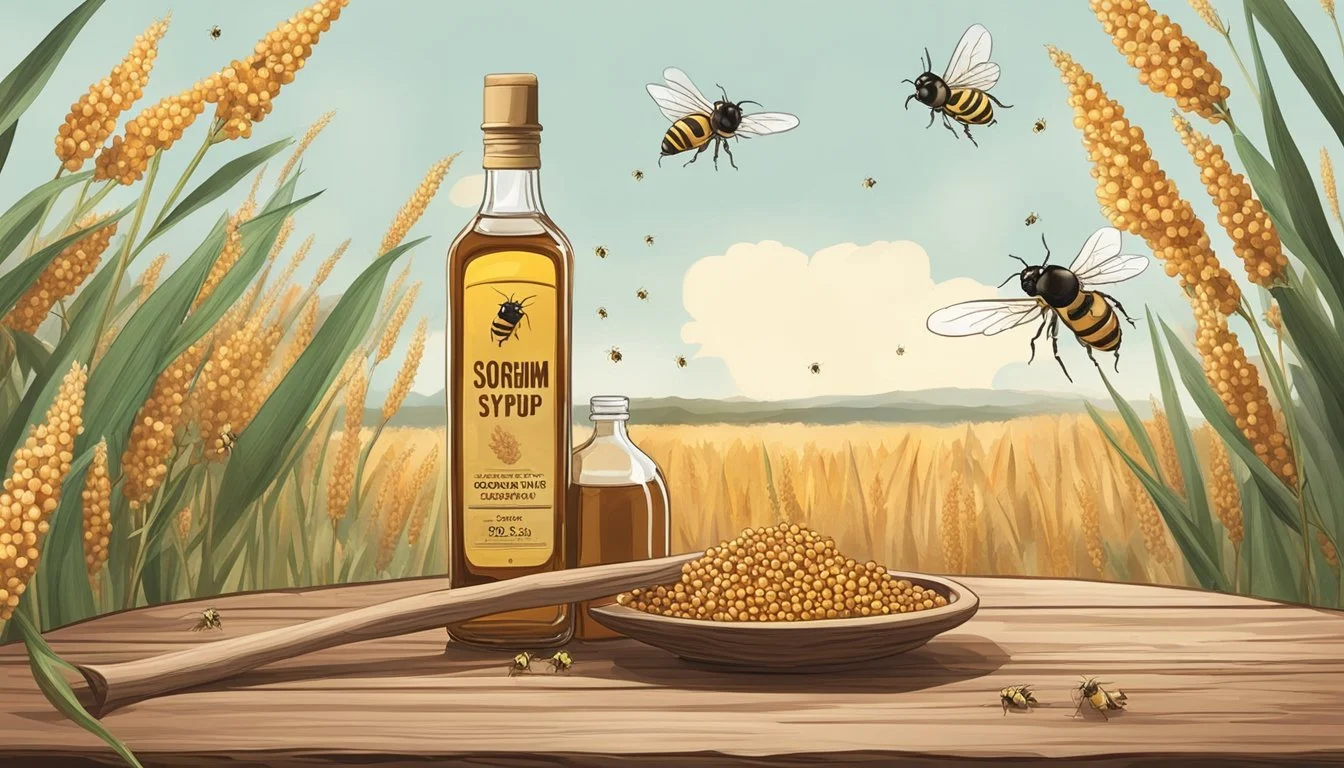Is Sorghum Syrup Vegan?
Unveiling the Sweetener's Plant-Based Status
Sorghum syrup is a natural sweetener obtained from the stalks of the sorghum plant. This plant-based syrup has a rich history, having been a staple in traditional diets for thousands of years. The syrup provides a rich, caramel-like flavor that enhances a variety of foods ranging from baked goods to marinades and sauces. As it is derived solely from the sorghum plant, it is considered suitable for a vegan diet which strictly avoids any animal products.
The rising trend of veganism emphasizes the consumption of plant-based foods while ruling out animal-derived ingredients in order to align with ethical, environmental, and health-conscious goals. Sorghum syrup fits well within this dietary framework. It is extracted through a process of juicing and boiling down the saccharine liquid from the sorghum stalks, without the need for animal inputs or by-products, ensuring that it adheres to vegan standards.
In addition to being vegan-friendly, sorghum syrup is revered for its nutrient content, offering a source of minerals such as potassium, iron, and calcium, along with B vitamins. The natural production process and nutritional benefits make sorghum syrup an appealing choice for those looking to maintain a vegan lifestyle without compromising on taste or nutritional value.
What Is Sorghum Syrup?
Sorghum syrup is a natural sweetener derived from the juice of the sorghum plant, a type of grass that belongs to the Panicoideae subfamily. This syrup is sometimes referred to as sorghum molasses, although it is different from true molasses, which is a byproduct of sugar cane or sugar beet processing.
Production Process:
Juice Extraction: The first step involves pressing the stalks of the sorghum plant to extract the juice.
Heating: The juice is then heated, which concentrates it through the evaporation of water, leading to the sweet syrup.
Cooling and Bottling: After reaching the desired thickness, the syrup is cooled and bottled for consumption.
The resulting syrup is thick, dark, and known for its robust, earthy sweetness. It is a versatile ingredient used in various culinary applications, including baking and as a topping for pancakes and biscuits.
Nutritional Information:
Sorghum syrup contains iron, calcium, and potassium.
It is devoid of significant amounts of protein, with only trace amounts present.
Sorghum syrup is made directly from sorghum juice.
Molasses is a by-product of sugar cane or sugar beet refined sugar production.
Sorghum syrup's attributes as a natural sweetener and its unique flavor profile make it an appealing alternative for many seeking less processed sugar options with a distinctive taste. It is especially popular in the Southern United States and is making a resurgence in modern cuisine for its rich, deep flavor.
Understanding the Vegan Diet
A vegan diet is characterized by the exclusion of all animal products and byproducts, which entails a reliance on plant-based ingredients.
Defining Veganism
Veganism is a dietary and lifestyle choice where individuals abstain from using animal products in all forms. They focus on plant-based foods such as vegetables, fruits, grains, legumes, nuts, and seeds. Vegans ensure that their diet does not include meat, dairy, eggs, or any ingredients derived from animals.
Common Ingredients in a Vegan Diet
In a vegan diet, individuals consume a wide array of plant-based ingredients. They use various grains, including sorghum, wheat, rice, and quinoa. Vegans might also make extensive use of natural sweeteners like sorghum syrup, which is a favorable substitute for honey or white sugar. Some common ingredients and additives can be sourced from both plant and animal origins, such as glycerin and stearic acid, making label reading and awareness crucial for maintaining vegan ethics.
Whole Grains: Sorghum, oats, wheat, barley
Fruits & Vegetables: Apples, leafy greens, berries, root vegetables
Legumes, Beans, & Seeds: Lentils, chickpeas, hemp seeds, flaxseeds
Nuts: Almonds, cashews, walnuts
Additives & Sweeteners: Agar-agar, sorghum syrup, apple cider vinegar
Vinegar is another ingredient that is typically vegan, although they must be mindful of certain varieties like honey vinegar. Labels provide crucial information and vegans often have to scrutinize them to ensure products do not contain animal-based additives.
Analyzing Sorghum Syrup's Composition
When assessing whether sorghum syrup is vegan, one must scrutinize its nutritional content and check for any potentially non-vegan ingredients that could be used during processing.
Nutritional Profile of Sorghum Syrup
Sorghum syrup, derived from the stalks of the sweet sorghum plant, is a natural sweetener. It is composed primarily of sugars—in the form of sucrose, glucose, and fructose—and water. The syrup contains a modest amount of nutrients, including:
Minerals: Iron, calcium, and potassium are found in trace amounts, contributing to the syrup's nutritional value.
Vitamins: Though present in smaller quantities, some B vitamins may also be present.
Protein and Fiber: The syrup has low protein content and minimal fiber.
Nutrient Amount Iron Trace amounts Calcium Trace amounts Potassium Trace amounts B Vitamins Present in small quantities Fiber Minimal Protein Low
The syrup has a lower glycemic index compared to other sweeteners like white sugar or high-fructose corn syrup, making it a potentially better option for blood sugar control.
Potential Non-Vegan Ingredients
Sorghum syrup is typically vegan as it is plant-derived and does not contain ingredients of animal origin. However, in some processing methods, non-vegan clarifying agents may be used. It is important for vegans to verify that the production process does not include bone char or other animal-derived substances. Furthermore, the equipment used for processing sorghum syrup should not be shared with non-vegan products to avoid cross-contamination.
Comparing Sorghum Syrup With Other Sweeteners
Sorghum syrup stands as a plant-based sweetener often compared to more traditional sweeteners like molasses and maple syrup. Each has distinct flavors and nutritional profiles, compelling individuals to contemplate their choice in the context of health and dietary preferences.
Sorghum Syrup vs. Molasses
Molasses, particularly blackstrap molasses, is a byproduct of sugar cane refining and typically has a bittersweet flavor. Unlike sorghum syrup, molasses contains higher levels of vitamins and minerals, such as vitamin B6 and manganese. However, sorghum syrup, although similar in taste to molasses, boasts a lighter, less bitter flavor and retains some of its nutrients since it's not a byproduct but a direct syrup made from sorghum grains.
Flavor: Sorghum syrup has a milder, less bittersweet taste compared to molasses.
Nutrition: While both offer nutrients, molasses generally has more vitamin content.
Sorghum Syrup vs. Maple Syrup
Maple syrup is known for its characteristic caramel-like flavor and is primarily harvested from the sap of the maple tree. It differs substantially from sorghum syrup, not just in origin but also in taste and glycemic index (GI). Maple syrup has a slightly higher GI compared to sorghum syrup, meaning it may raise blood sugar levels more quickly.
Flavor: Maple syrup offers a more pronounced caramel-like sweetness.
GI Rating: Maple syrup's GI is typically higher than that of sorghum syrup.
The Healthier Alternatives
When considering a healthier alternative to refined sugar, both sorghum syrup and its counterparts present certain advantages. Sorghum syrup, in particular, offers minerals like iron, calcium, and potassium, making it not only a vegan-friendly option but also one contributing to a balanced diet. It doesn't contain the "empty calories" often associated with refined sugar, and its lower GI makes it a more stable energy source.
Nutrition: Sorghum syrup contains minerals and provides a steady energy release.
Versatility: It can act as a 1:1 substitute for various liquid sweeteners in recipes.
Conscious of their health and dietary impact, consumers find that options like sorghum syrup can satisfy sweet cravings while offering more nutritional benefits than refined sugar.
Sorghum Syrup in Vegan Cooking
When adopting a vegan diet, finding suitable alternatives to animal-derived ingredients is important. Sorghum syrup stands out as a versatile sweetener with a rich flavor that adds depth to a variety of vegan dishes, especially in baking and creative recipes.
Baking with Sorghum Syrup
In vegan baking, sorghum syrup is a valuable ingredient for its ability to retain moisture in baked goods. It can serve as a direct substitute for honey or molasses, offering a slightly less intense sweetness. When making waffles or pumpernickel bread, for instance, one can substitute sorghum syrup on a one-to-one basis for other liquid sweeteners. The syrup works well with oat flour and can help to create a tender crumb in cakes and muffins.
For a standard vegan cake recipe, consider the following ratio:
1 cup oat flour
1 tsp baking powder
1/4 cup sorghum syrup
1 tsp vanilla extract
Use aquafaba as an egg replacement to bind ingredients and enhance fluffiness.
Creative Sorghum Syrup Recipes
Sorghum syrup's robust flavor makes it an excellent base for a variety of creative vegan recipes. It can be infused into homemade barbecue sauces, imparting a smoky sweetness ideal for grilled vegetable dishes.
For a simple vegan barbecue glaze:
1/2 cup sorghum syrup
2 tbsp apple cider vinegar
1 tsp smoked paprika
Salt and pepper to taste
This glaze can be brushed onto vegetables before roasting to enhance their natural flavors. Additionally, sorghum syrup drizzled over vegan ice cream or mixed into desserts adds a complexity of flavor that complements the other ingredients without overpowering them.
Benefits of Sorghum Syrup
Sorghum syrup is esteemed for its nutritional properties and its role in a healthy diet. This natural sweetener, derived from the sorghum plant, is not only vegan but also a nutritive addition to various foods.
Nutritional Advantages
Protein and Fiber: Sorghum syrup contains small amounts of protein and is a rich source of dietary fiber, which supports digestive health.
Vitamins and Minerals: It is a notable source of essential minerals such as:
Iron: Vital for blood health
Calcium: Important for bone strength
Magnesium: Plays a role in over 300 enzyme reactions
Sorghum syrup also contains B vitamins, which are important for energy metabolism and overall wellbeing.
Sorghum Syrup in a Balanced Diet
Whole Grain Origins: Sorghum is considered a whole grain and touted as a superfood due to its comprehensive nutrient profile, which is largely retained in the syrup form.
Antioxidants: It offers a range of antioxidants that help protect the body against oxidative stress.
By incorporating sorghum syrup into one's diet, individuals can enjoy a natural sweetener that contributes beneficial nutrients without resorting to highly processed sugars.
The Gluten-Free Aspect of Sorghum Syrup
Sorghum syrup is a natural sweetener derived from the sorghum plant, and it has gained popularity particularly amongst those requiring a gluten-free diet. This section examines how sorghum syrup fits into a gluten-free lifestyle, focusing on product identification and benefits for individuals with gluten intolerance.
How to Identify Gluten-Free Products
When seeking gluten-free products, consumers should look for labels that explicitly state "gluten-free" or "certified gluten-free." This certification indicates that the product has undergone testing to ensure it meets strict standards for gluten content. Sorghum syrup typically does not contain gluten, as it is processed from the sorghum plant which is naturally gluten-free. However, it's essential to verify that there is no cross-contamination during manufacturing. Sorghum flour is also gluten-free and serves as an alternative to gluten-containing flours for baking.
Identifying Labels
Gluten-Free: Often displayed prominently on the front packaging.
Certified Gluten-Free: Implies extra verification by third-party organizations.
Advantages for Gluten Intolerance
For individuals with gluten intolerance or celiac disease, incorporating sorghum syrup into their diet can be advantageous. Unlike some sweeteners that may be processed with additives containing gluten, sorghum syrup ensures a safer option with no hidden gluten sources. Additionally, sorghum flour made from the same plant offers a nutritious and safe alternative for gluten-free baking.
Benefits of using sorghum syrup and sorghum flour:
Naturally gluten-free, reducing the risk of symptoms associated with gluten intolerance.
Provides an alternative to traditional wheat flour in recipes.
Enriches the diet with variety, without compromising on taste or texture.
By choosing sorghum-based products, individuals managing a gluten-free diet can enjoy a diverse range of foods while maintaining peace of mind regarding their gluten intake.
Where and How to Find Sorghum Syrup
Sorghum syrup, a plant-based sweetener, is primarily sourced from sorghum, often referred to as Chinese sugarcane. Individuals in North America, as well as globally, can find this vegan-friendly product both in physical retail locations and through various online platforms.
Retail Availability
Health food stores are the most common brick-and-mortar locations where shoppers can expect to find sorghum syrup. It is typically placed within the sweetener or baking aisles. Shoppers should look for labels stating 100% pure sorghum syrup to ensure they are getting a genuine product and not a blend with other sweeteners. As sorghum syrup is a specialized item, it may not be as widely available in all grocery stores. However, stores that focus on natural and organic products are more likely to stock it.
Online Purchase Options
For those preferring the convenience of online shopping, sorghum syrup is readily available on various platforms. Online retailers often provide a broad selection, including different brands and package sizes, which are not always available in physical stores.
Popular Online Retailers:
Amazon
Specialty vegan and health food stores' websites
eBay
When purchasing online, consumers can compare products, read reviews, and check ingredient lists more efficiently. It is recommended to confirm the credibility of the seller and to check whether the syrup is made from 100% sorghum. Some sellers might offer the option to sign up for email notifications for restocks or discounts. Additionally, certain online marketplaces have mobile apps that can alert shoppers to new sorghum syrup products or special promotions.
Sorghum Syrup's Role in Sustainability
Sorghum syrup, derived from the sweet sorghum plant, is noteworthy for its role in sustainable agriculture. It has been recognized as a resilient crop that consumes less water compared to many conventional crops, which aligns with sustainability goals regarding water conservation.
Water Efficiency: The sorghum plant has a natural tolerance for drought conditions, making it a water-efficient option. This is particularly significant in areas where water resources are scarce or are being conserved for ecological balance.
Sustainability: Sorghum's adaptability to diverse climates and soil types enhances its sustainability profile. Its cultivation can lead to decreased reliance on irrigation, thus minimizing water usage and preserving vital resources.
Production: When it comes to production, the by-products of sorghum syrup manufacture, including bagasse, hold potential for biofuel production. This can reduce waste and contribute to a circular economy.
The following points encapsulate the essence of sorghum syrup's contribution to sustainability:
Low water dependency ensures less strain on water resources.
The plant's resilience reduces the need for chemical interventions, promoting eco-friendly farming practices.
By-product utilization in biofuels further decreases the environmental impact.
Sorghum also shows promise in sustainable biofuel production, which can lead to a reduction in fossil fuel dependence and greenhouse gas emissions. This positions sorghum syrup not just as a vegan sweetener but also as part of a future-oriented approach to agriculture and energy.
Conclusion
Sorghum syrup is a plant-based sweetener derived from the sorghum plant. It does not contain any animal-derived ingredients or byproducts in its production process, which aligns it with vegan dietary standards. As such, sorghum syrup is a suitable sweetener for those adhering to a vegan lifestyle, who often seek alternatives to common sweeteners that may include animal involvement.
This syrup offers a rich, distinct flavor and a versatility that is appreciated in various culinary contexts, from baking to glazing. Vegans can incorporate it into their diets as an alternative to other non-vegan sweeteners such as honey. The nutritional profile of sorghum syrup, while similar to other natural sweeteners, still requires moderation due to its sugar content.
In considering sorghum syrup as a vegan sweetener option, individuals may also weigh its environmental impact, which tends to be lower compared to some other crops as sorghum typically requires fewer resources to grow.
To summarize, sorghum syrup is a viable and ethical choice for those on a vegan diet:
No animal products: Purely plant-derived.
Versatile: Suitable for various recipes.
Flavorful: Offers a unique taste experience.
Eco-friendly: Generally has a lower environmental footprint than some alternatives.
Consumers looking for a sustainable and vegan-friendly sweetening agent can confidently incorporate sorghum syrup into their culinary arsenal.

